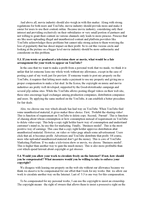As use of internet increased substantially, motion picture companies found ways to increase their benefit from it. Nowadays, we can watch our favourite videos on easily on YouTube which started up in February 2005 and quickly gain popularity that soon became the most popular video-sharing web site in the world, but it turns out to have some ups and downs of its service. To address our thoughts of YouTube, first we have analysed its service comparing through Porter’s competitive model of movie industry. Then, we have found relative problems caused by this video-sharing web site. Finally, we will come to a solution of a dispute between YouTube, Motion picture companies and users.
1.1. What competitive forces have challenged the movie industry?
To have a better overview of the competitive forces we will us the Porter Five Forces Analysis.
Threat of new competition
The internet has shown a huge growth of new companies. Companies have changed the way of doing business. It also has dramatically decreased the costs of setting up a new company. Also meaning that whenever somebody has a new idea and the movie industry does not react on it quickly enough. It means they might gain a new competitor. The easiness of distribution of movies has increased the threat of new competition. Already you are seeing independent movie makers creating movies to see for free on the world wide web. This development is only expected to increase.
Threat of substitute products or services
The threat of substitute products or services for the movie industry mainly relates to the way the costumers can have access. Meaning that the traditional way of presenting movies first changed along with the introduction of the television, then the recording devices like VHS and DVD. And now of course, providing the movies on the internet. This however is related to the potential new business models of competitors. Who provide the services in a different way. In some cases this way could be copy able. Meaning it is not necessarily a big threat.
2. MGM 영화사, 온라인 동영상 사이트 유튜브와 제휴, , 2008/11/11 12:41, http://blog.yahoo.com/_O4HXYJRVBMI2B5K2P3QC35QUXM/articles/547788
3. 유튜브 스토어, 온라인 영화 서비스의 미래 모습일까?, 2011/5/4, http://logfile.tistory.com/1047
4. 유튜브를 이용한 바이럴 마케팅, 블로그, 2012/2/5, http://lucyfam.blog.me/50133296219
5. 유튜브를 이용한 놀라운 영화 홍보 바이럴 마케팅-The Expendables explosive interview with Sylvester Stallone, 2010/10/25, http://blog.naver.com/PostView.nhn?blogId=stussy9505&logNo=60117208607&parentCategoryNo=47&viewDate=¤tPage=1&listtype=0&from=postList
6. 유튜브 ‘저작권 보호+광고’ 프로그램 본격가동, 2008/9/23, http://asadal.bloter.net/380
7. 유튜브 저작권, 유튜브의 작권 침해 처리방침, 2012/2/6, http://www.eventful.co.kr/index.php?document_srl=61845
8. 유튜브로 할리우드 신작 볼 수 있다, , 2011/4/27, http://cn.moneta.co.kr/Service/paxnet/ShellView.asp?ArticleID=2011042717494006144
9. http://youtubekrblog.blogspot.com/2008/04/blog-post_21.html
목차
Introduction
1.1. What competitive forces have challenged the movie industry?
1.2. What Problems have these forces created?
1.3.What changes have these problems caused the movie and television studios to make?
2. Describe the impact of disruptive technology on the motion picture industry?
3.1. How have the movie studios responded to YouTube?
3.2. What is goal of the response?
3.3. What can the movie studios learn from the music industry’s dealings with online digital music and copyright infringement?
4. Should motion picture companies continue to use YouTube to promote their new films? Why or why not?
5.1. Go to YouTube.com and search for videos from our favourite movie or television show. What do you find on the site?
5.2. To whom do you assign more responsibility for unauthorized copyrighted material appearing on the site, the users who uploaded it or YouTube?
5.3. If you wrote or produced a television show or movie, what would be a fair arrangement for your work to appear on YouTube?
5.4. Would you allow your work to circulate freely on the Internet? If not, how should you be compensated? What measures would you be willing to take to enforce your copyright?
Conclusion











 분야
분야


